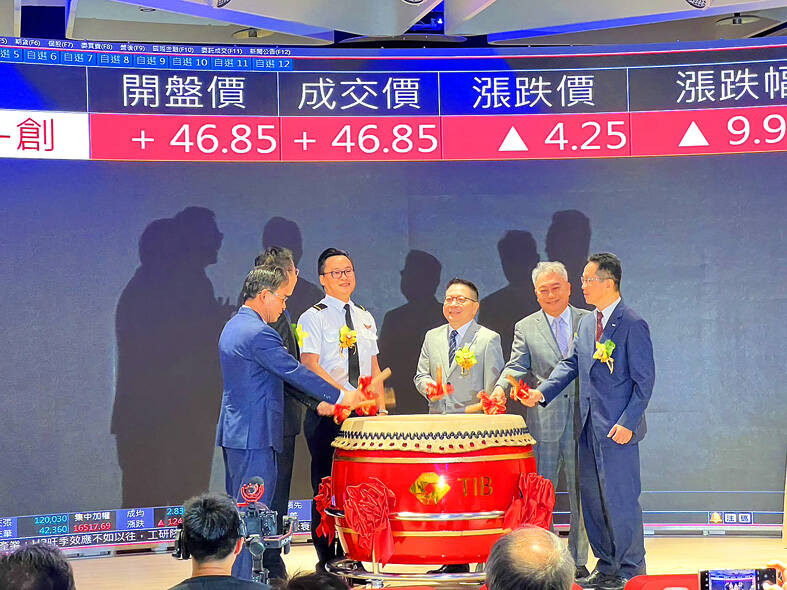Shares of Tigerair Taiwan Ltd (台灣虎航) yesterday rose 4.46 percent on their debut on the Taiwan Stock Exchange’s (TWSE) new trading platform — the Taiwan Innovation Board.
The low-cost carrier became the 10th company to launch an initial public offering (IPO) on the main bourse this year. It was also the first time an airline has gone public on the TWSE since EVA Airways Corp’s (長榮航空) listing in 2001.
China Airlines Ltd (CAL, 中華航空) listed its shares on the main bourse in 1993, while Starlux Airlines Co (星宇航空) has been trading its shares on the Taipei Exchange’s Emerging Stock Board since September last year.

Photo: Wang Yi-hung, Taipei Times
Tigerair shares rose to their 10 percent daily limit of NT$46.85 in early morning trade from its IPO price of NT$42.60, before retreating to close at NT$44.50, outpacing the TAIEX’s 0.37 percent rise.
Established in 2014 as a joint venture between CAL and Singapore’s Tiger Airways Ltd before becoming CAL’s wholly owned subsidiary in 2017, Tigerair offers flights to 27 destinations in Asia, including Japan, Macau, Philippines, South Korea, Thailand and Vietnam.
The airline posted a net profit of NT$336.07 million (US$10.52 million) last quarter, its second straight quarterly profit after the first quarter’s NT$428.63 million.
First-half net profit totaled NT$764.7 million, or earnings per share (EPS) of NT$1.87, compared with losses of NT$3.61 per share a year earlier due to the impact of the COVID-19 pandemic.
Among listed airlines, Tigerair’s first-half EPS was second only to EVA’s NT$1.95, and ahead of CAL’s NT$0.77 and Starlux’s NT$0.18, exchange data showed.
The budget carrier’s combined revenue in the first seven months of the year jumped 1,762.84 percent year-on-year to NT$6.74 billion, after last month’s sales surged 2,223.41 percent to a record NT$1.26 billion, as the industry continued to benefit from strong demand for air travel since the relaxation of border controls in October last year.
Unique Satellite TV quoted Tigerair chairman Kevin Chen (陳漢銘) as saying at yesterday’s listing ceremony that the carrier’s business in the second half of the year would be even better than the first half.
Tigerair’s net value per share improved to NT$6.01 in the second quarter, from NT$3.46 in the first quarter.
The carrier aims to raise the figure close to its par value of NT$10 by the end of this year by lowering aggregate losses, Chen said.
Tigerair has accumulated losses of about NT$2.2 billion, company data showed.
The airline has so far accepted deliveries of four Airbus 320neos and would continue to renew its fleet until 2027, Chen said.
“Tigerair will receive another 11 A320neos by 2027, as the company plans to retire two old planes while adding two new aircraft each year over this period,” Chen was quoted as saying. “By 2027, the average age of Tigerair’s 15-plane fleet would be only three-and-a-half years old, making it the youngest fleet among Taiwanese airlines.”

SEMICONDUCTORS: The German laser and plasma generator company will expand its local services as its specialized offerings support Taiwan’s semiconductor industries Trumpf SE + Co KG, a global leader in supplying laser technology and plasma generators used in chip production, is expanding its investments in Taiwan in an effort to deeply integrate into the global semiconductor supply chain in the pursuit of growth. The company, headquartered in Ditzingen, Germany, has invested significantly in a newly inaugurated regional technical center for plasma generators in Taoyuan, its latest expansion in Taiwan after being engaged in various industries for more than 25 years. The center, the first of its kind Trumpf built outside Germany, aims to serve customers from Taiwan, Japan, Southeast Asia and South Korea,

Gasoline and diesel prices at domestic fuel stations are to fall NT$0.2 per liter this week, down for a second consecutive week, CPC Corp, Taiwan (台灣中油) and Formosa Petrochemical Corp (台塑石化) announced yesterday. Effective today, gasoline prices at CPC and Formosa stations are to drop to NT$26.4, NT$27.9 and NT$29.9 per liter for 92, 95 and 98-octane unleaded gasoline respectively, the companies said in separate statements. The price of premium diesel is to fall to NT$24.8 per liter at CPC stations and NT$24.6 at Formosa pumps, they said. The price adjustments came even as international crude oil prices rose last week, as traders

POWERING UP: PSUs for AI servers made up about 50% of Delta’s total server PSU revenue during the first three quarters of last year, the company said Power supply and electronic components maker Delta Electronics Inc (台達電) reported record-high revenue of NT$161.61 billion (US$5.11 billion) for last quarter and said it remains positive about this quarter. Last quarter’s figure was up 7.6 percent from the previous quarter and 41.51 percent higher than a year earlier, and largely in line with Yuanta Securities Investment Consulting Co’s (元大投顧) forecast of NT$160 billion. Delta’s annual revenue last year rose 31.76 percent year-on-year to NT$554.89 billion, also a record high for the company. Its strong performance reflected continued demand for high-performance power solutions and advanced liquid-cooling products used in artificial intelligence (AI) data centers,

SIZE MATTERS: TSMC started phasing out 8-inch wafer production last year, while Samsung is more aggressively retiring 8-inch capacity, TrendForce said Chipmakers are expected to raise prices of 8-inch wafers by up to 20 percent this year on concern over supply constraints as major contract chipmakers Taiwan Semiconductor Manufacturing Co (TSMC, 台積電) and Samsung Electronics Co gradually retire less advanced wafer capacity, TrendForce Corp (集邦科技) said yesterday. It is the first significant across-the-board price hike since a global semiconductor correction in 2023, the Taipei-based market researcher said in a report. Global 8-inch wafer capacity slid 0.3 percent year-on-year last year, although 8-inch wafer prices still hovered at relatively stable levels throughout the year, TrendForce said. The downward trend is expected to continue this year,